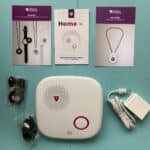Medical Alert vs. Medical Guardian: Full Comparison for 2025
Key Takeaways
- Monthly costs vary, from $29.95–$44.95 for Medical Guardian, and $27.95–$47.95 for Medical Alert.
- Both companies offer 24/7 monitoring as well as at-home and on-the-go devices.
- While Medical Guardian and Medical Alert are similar in terms of products and services, we recommend Medical Guardian as the better choice based on its faster response time, premium features, and larger variety of device choices (such as a smartwatch).
Trying to decide between Medical Guardian vs. Medical Alert? They’re two of the best known medical alert systems on the market, but which is better? That will depend on your individual needs.
Medical alert systems work using a small base unit paired with a wireless help button to connect to a company’s 24/7 monitoring center, using either a landline (for at-home systems) or cellular network (for on-the-go systems). A cellular network is the same connection smartphones use. When you press the device’s help button, the base unit receives the signal and connects you with the monitoring center, where trained operators dispatch emergency services to you if you need them.
Finding the right medical alert system that fits your needs can be difficult, since there are so many plans and models to choose from, and many medical alert companies offer similar products.
To help make it easier, we conducted in-depth research on Medical Guardian vs. Medical Alert reviews. Ultimately, our team recommends Medical Guardian over Medical Alert, but both companies have pros and cons to consider.
Keep reading for a comprehensive overview of Medical Guardian vs. Medical Alert to find the best product for you.
Why you can trust our expert reviews
Our team spent more than 2,500 hours conducting in-depth research on medical alert systems. During our process, we:
- Engaged in ongoing independent research
- Consulted with licensed adult caregivers and doctors who specialize in senior care
- Mystery shopped 13 medical alert system brands
- Surveyed 1,000 medical alert system users
- Tested various medical alert systems
- Read hundreds of verified customer reviews from trusted third parties, such as Better Business Bureau (BBB) and Trustpilot
Read more about our medical alert systems review methodology.
Why we chose to review Medical Guardian vs. Medical Alert
To help you decide which medical alert system is best for you, we compared two well-known companies. We chose to review Medical Guardian for its premium features and Medical Alert for its low prices and all-in-one device.
We created a side-by-side comparison of these companies based on costs, customer service, and special features. Both companies offer similar products and services, but there are some differences that distinguish one brand from the other.
We surveyed 1,000 medical alert system users, and results showed 82% of Medical Guardian users had a good experience with their medical alert system purchase, compared to 71% of Medical Alert users.
If neither Medical Guardian nor Medical Alert are a good fit, there are several other medical alert systems to consider. For example, in our best medical alert systems review, we named Bay Alarm Medical “Best for the Price,” and MobileHelp “Best for No Extra Fees.”
Medical Alert vs. Medical Guardian: Full Comparison
Medical Guardian
Medical Guardian was founded in 2006 by Geoff Gross, a young entrepreneur looking for a way to help his grandmother live independently for as long as possible. Since then, the company has expanded to become one of the country’s leading medical alert providers.
The Medical Guardian website is easy to navigate and clearly summarizes its products and services. It also includes a product quiz to help identify which model is best for your needs and lifestyle. When reaching out to customer service, we found the staff to be courteous and helpful.
Medical Guardian has one of the fastest response times in the industry at 1–25 seconds, based on our internal testing. The industry average is about 30 seconds, according to our research. The app is another differentiating factor for Medical Guardian—users can contact their caregivers directly through the app, making it convenient for those who have multiple caregivers, such as friends, neighbors, and family. Medical Guardian also has a longer maximum device range than Medical Alert—with Medical Guardian’s 1,400 feet almost double Medical Alert’s 800 feet.
Medical Guardian offers five different devices (described below), including one smartwatch. Its five options include two at-home models: the MGHome Cellular and MGClassic; and three on-the-go models: the MGMini Lite, MGMini, and MGMove Smartwatch.
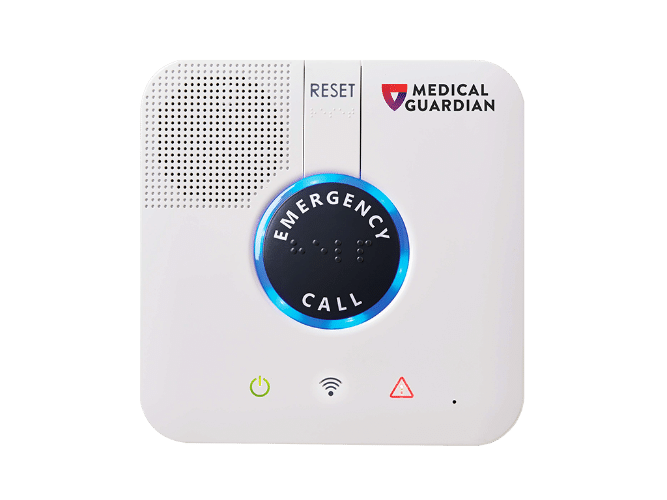
MGClassic
- Medical Guardian’s entry-level at-home system
- Starting monthly cost: $29.95
- Activation fee: $0
- Equipment fee: $0
- Shipping fee: $12.50
- Dimensions: 6 inches x 6 inches W x 2.8 inches (length x width x height)
- Weight: 1.23 pounds (lbs)
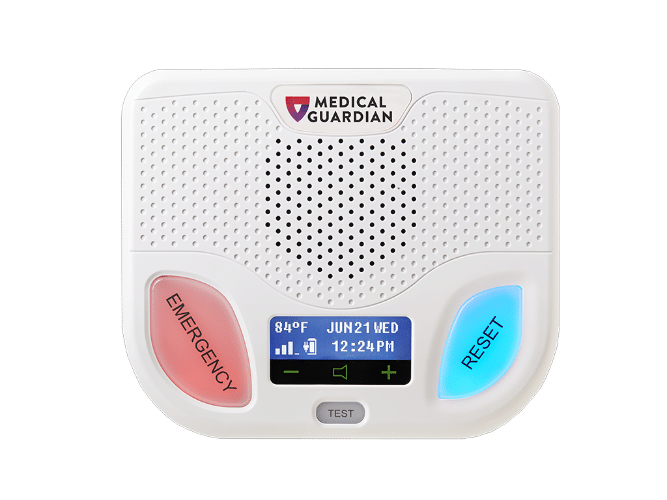
MGHome Cellular
- Medical Guardian’s advanced at-home system
- Starting monthly cost: $37.95
- Activation fee: $0
- Equipment fee: $149.95
- Shipping fee: $12.50
- Dimensions: 6.4″ L x 2.3″ W x 3″ H inches
- Weight: 1.27 lbs

MGMini Lite
- The brand’s smallest on-the-go system
- Starting monthly cost: $44.95
- Activation fee: $0
- Equipment fee: $149.95
- Shipping fee: $12.50
- Dimensions: 1.5″ L x 1.4″ W x 0.5″ H (watch face)
- Weight: 0.7 ounces (oz)
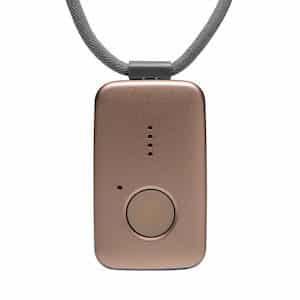
MGMini
- Available in four colors
- Starting monthly cost: $39.95
- Activation fee: $0
- Equipment fee: $149.95
- Shipping fee: $12.50
- Dimensions: 2.1″ L x 1.3″ W x 1.7″ H
- Weight: 1.3 oz
Use “NCOA” promo code at checkout for $50 off the MGMini
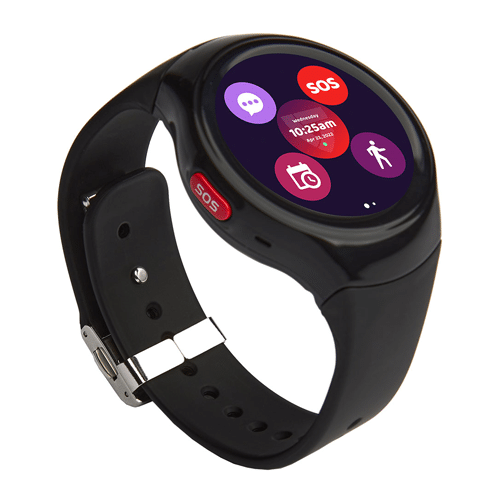
MGMove
- Medical Guardian’s smartwatch
- Starting monthly cost: $39.95
- Activation fee: $0
- Equipment fee: $199.95
- Shipping fee: $12.50
- Dimensions: 1.25-inch-diameter watch face
- Weight: 2 ounces
Medical Guardian customer service and payment options
The customer service team at Medical Guardian is available by phone, email, or chat on its website. The team is available by phone at 800-295-9350 Monday through Friday from 9 a.m. to 8 p.m. ET and Saturdays from 9 a.m. to 5 p.m. ET.
You can also email the customer service address at MGCustomerCare@medicalguardian.com.
For quick questions, Medical Guardian has a chat service on its website that quickly connects you to an agent. Chat availability is the same as phone availability.
Medical Guardian accepts payments in the form of check, credit card, or check by phone.
Medical Alert
Medical Alert was founded in 2004 by Connect America, a 45-year-old organization that partners with medical professionals and health plans to deliver services that assist older adults in living independently. Today, Medical Alert is one of the country’s largest independent providers of medical alert systems.
The company’s website clearly explains the costs for its products and services, and ordering online is a simple process. Despite the easy-to-use website, we found that Medical Alert has fewer options for customer service than Medical Guardian—Medical Alert offers only a customer service phone and a contact form on its website, while Medical Guardian offers phone, email, or online chat. But we did use the contact form on the Medical Alert website and received a satisfactory response to their question within one hour.
Medical Alert offers a 30-day risk-free trial period, and cancellations are simple: A free return label is included for the equipment if you decide to cancel. The company does have a longer response time (25–50 seconds) based on our testing, although it’s still below the industry average of 30 seconds. It also has a shorter maximum device range (800 feet) than Medical Guardian (1,400 feet).
Medical Alert offers three packages: a landline at-home system, a cellular at-home system, and an on-the-go mobile system.
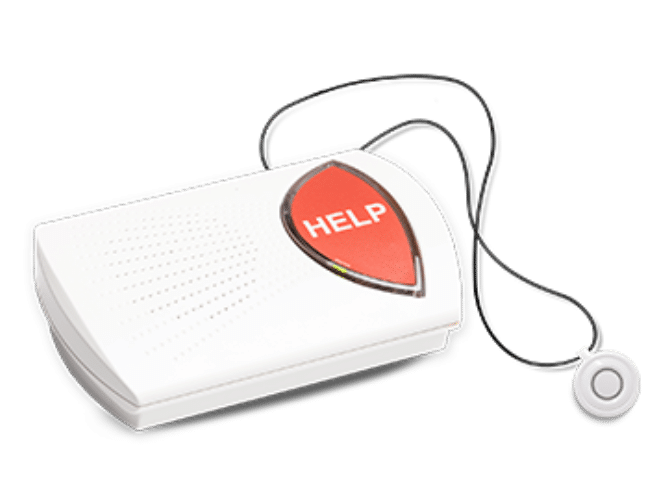
Home system (landline and cellular)
- Medical Alert’s at-home system
- Starting monthly cost: $27.95 (landline) or $37.95 (cellular)
- Activation fee: $99.95
- Equipment fee: $0
- Dimensions: 6.1 x 1.8 x 2.7 inches (length x width x height)
- Weight: 0.9 ounces
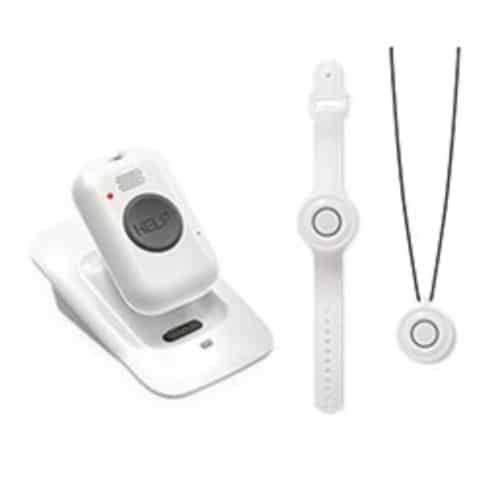
Mobile system
- Medical Alert’s on-the-go system
- Starting monthly cost: $47.95
- Activation fee: $99.95
- Equipment fee: $0
- Dimensions: 2” L x 1.5” W x .75” H
- Weight: 1.3 ounces
Medical Alert customer service and payment options
The customer service team at Medical Alert is available by phone or a contact form on its website. The team is available by phone at 800-800-2537 Monday through Friday from 9 a.m. to 6 p.m. ET.
Medical Alert accepts payments in the form of credit cards.
Table 1 Comparisons of Medical Guardian vs. Medical Alert
| Starting monthly cost | $29.95–$44.95 | $27.95–$47.95 |
| Equipment cost | $0–$199 | $0 |
| Activation fee | $0 | $99 |
| Installation fee | $0 | $0 |
| Range | 1,400 feet | 800 feet |
| Battery life | 32-hour backup battery for at-home; 3–5 days for mobile devices | 30-hour backup battery for at-home; 5 days for mobile devices |
| Fall detection option | Yes, additional $10 per month | Yes, additional $10 per month |
| Contract | No | No |
| Connection type | Cellular or landline | Cellular or landline |
| Water-resistant | Yes | Yes |
| GPS tracking option | Yes | Yes |
| Two-way voice communication | Yes | Yes |
| Mobile app | Yes | Yes |
| Optional monthly add-ons | Fall detection, lockbox, and OnGuard Alerts | Fall detection and protection plan |
| Special features | Jewelry accessories to conceal wearable necklaces | 30-day, risk-free trial allows customers to try before buying |
How do I choose the best medical alert system for me?
Choosing the best medical alert system starts with considering the different device types, such as at-home vs. on-the-go systems, monitoring assistance, and battery life.
According to Teri Dreher, a registered nurse and the founder of NShore Patient Advocates, a home health care service, choosing the best medical alert system for you means finding one you’ll actually use. “Adult children are always concerned about safety, and their older parents are always worried about independence…so some older adults object to medical alert systems because of the perception that it makes them seem feeble or infirm,” said Dreher. But ultimately it’s up to the person who will be wearing or using the device, since if they refuse or forget to use it, you might as well not be using a medical alert system at all, cautioned Dreher. So when searching, be sure to get the features you need, that you have a full understanding of the medical alert costs, and that you’ll actually use the device.
Here are several things to think about when deciding which medical alert system is right for you.
At-home vs. on-the-go systems
At-home medical alert systems include a base unit that connects to a monitoring center via landline or cellular service, and a wearable or wall-mounted button that communicates with the base unit. When you press the help button, you activate the system and connect to the monitoring center where an operator will ask if you need assistance. If you need help, the operator calls emergency services to your home.
An at-home system relies on having the help button close enough to the base station to pick up a signal. The Medical Guardian system has a maximum 1,400-foot range from the base unit, while the Medical Alert system has an 800-foot range.
Mobile, or on-the-go, systems are wearable devices that use cellular networks and GPS (satellite) tracking to locate and connect you to a monitoring center operator wherever you are, as long as you are within range of cellular coverage.
Monitoring assistance
The main benefit of having a monitored medical alert system is the 24/7 monitoring, which both Medical Guardian and Medical Alert offer. That means monitoring center operators are ready to assist should you need them, 24/7 and 365 days per year.
The Monitoring Association (TMA) has certified both companies as TMA Five Diamond, which means the companies have agreed to allow random inspections and adhere to quality control criteria.
Battery life
To protect users during a power outage, both Medical Guardian and Medical Alert include backup batteries in the at-home base stations to keep the system running. The Medical Guardian batteries last up to 32 hours, and the Medical Alert batteries last up to 30 hours.
Wall-mounted and wearable devices use rechargeable batteries that need to be recharged every few days.
Bottom line
We chose Medical Guardian as the better overall option due to its faster response time, longer device range, and ability to communicate with caregivers directly through the app—although Medical Alert does have lower monthly charges and no equipment fees.
Both Medical Guardian and Medical Alert are good companies, and both are transparent about pricing, with no hidden fees, no long-term contracts, and easy cancellation. During our mystery shopping experience, the customer service representatives for both companies were helpful and answered all of our questions, without using aggressive or pushy sales tactics.
If you’re on a budget, Medical Alert might be a better option since it’s less expensive. Medical Alert offers plans starting at $5–$10 less per month than Medical Guardian, a one-year prepayment discount, and no equipment fees.
In our survey, more than 35% of respondents said their medical alert system wearable didn’t look attractive. If you’re concerned about the way a medical alert device will look on you, Medical Guardian might be the better option—it offers a jewelry accessory line to conceal its wearable necklace device.
Frequently asked questions
Although Medical Guardian and Medical Alert are similar in terms of products, services like fall detection, and pricing, we chose Medical Guardian for its faster response time, longer device range, its app that allows users to communicate directly with caregivers, and for its larger variety of device choices, such as a smartwatch.
But Medical Alert does have lower starting monthly costs, so if budget is your most important consideration, Medical Alert may be a better choice.
No, they are not the same. Medical Guardian and Medical Alert have similar names and offer comparable products, but they are not the same company.
At-home medical alert systems consist of an electric-powered base unit that connects to a monitoring center via landline or cellular networks, and a wearable or wall-mounted button device that, when pressed, sends a signal to the base unit, connecting the user to the company’s monitoring service.
Wearable alert buttons can be worn as necklaces, wristbands, or smartwatches, and wall-mounted units can be placed in high-risk areas of the house, such as in the bathroom or on a staircase. Some models have an option for voice activation, for when it’s not possible to reach the button.
On-the-go, or mobile, alert systems are similar but use cellular networks and GPS tracking to connect users to emergency operators when the user is away from home. They also don’t need a base unit like at-home systems.
Have questions about this review? Email us at reviewsteam@ncoa.org.


